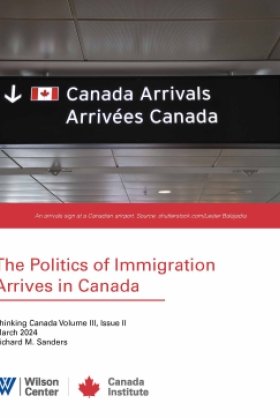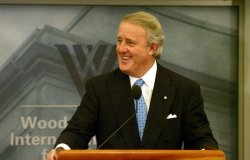Book Launch -- <i>Supreme Discomfort: The Divided Soul of Clarence Thomas</i>
Overview
Kevin Merida, Associate Editor, The Washington Post and Michael A. Fletcher, White House Correspondent, The Washington Post, co-authors; commentators Joan Biskupic, Supreme Court correspondent, USA Today and Mark Tushnet, William Nelson Cromwell Professor of Law, Harvard University.
Associate Justice Clarence Thomas, the second African American to serve on the United States Supreme Court and arguably its most conservative justice, may also be the Court's most controversial member. He is perhaps the most critically examined current Justice, with approximately 32,000 articles written about him between 1991 and 1997 alone. Thomas reached the Supreme Court, the pinnacle of the legal profession, early in his career, only twelve years after he served as a junior aide on Capitol Hill. After sixteen years on the Court, however, he remains an elusive figure, as Kevin Merida and Michael Fletcher noted in the Division of United States Studies' discussion of Supreme Discomfort.
Thomas was nominated by President George H.W. Bush in 1991 to fill the seat of Thurgood Marshall, the first African American to serve on the Court. The nomination produced the Senate confirmation hearings during which Thomas was accused of sexual harassment by Anita Hill, a former colleague at the Equal Employment Opportunities Commission (EEOC). Civil rights groups such as the NAACP opposed confirmation because Thomas' years as Assistant Secretary for Civil Rights in the Department of Education (1981-1982) and as chairman of the EEOC (1982-1990) had demonstrated what the NAACP described as a hostile attitude toward civil liberties and civil rights. Although he was confirmed nonetheless, the confirmation battle, Merida said, has shaped Thomas' life ever since.
Merida and Fletcher, both African-American journalists, undertook their volume because of the lack of studies exploring Thomas' persona through the racial prism that they believed was crucial to an understanding of his identity. Justice Thomas and other Justices with the exception of Antonin Scalia did not grant them interviews. Their research therefore consisted in large part of visiting the places where Thomas grew up (his birthplace in rural Pin Point, Georgia and Savannah, where he spent his boyhood) and interviewing his relatives, neighbors, classmates, and former colleagues. They also spoke with people who had conversations with Thomas in his chambers or other private settings. They learned that the Justice in private is quite different from the public person: warm, charming, accessible. What their interviewees reported, however, is that Thomas seems to have held onto every racial slight he has ever received, frequently railing as well against the "light black elite" and "light skinned blacks" whom he sees as overly privileged and as having failed to support him.
Thomas as a Justice made his brand of jurisprudence clear early in his court tenure, Fletcher said. In Hudson v. McMillan (1992), Thomas dissented when the majority of the Court declared that a Louisiana prisoner, who was severely beaten by prison guards while handcuffed and shackled, was a victim of unconstitutional cruel and unusual punishment. "When prison officials maliciously and sadistically use force to cause harm, contemporary standards of decency always are violated," Justice Sandra Day O'Connor wrote for the majority. "This is true whether or not significant injury is evident." Thomas replied that the Court should not bar "the unnecessary and wanton infliction of pain" in the absence of severe physical injury. Basing his opinion on the "originalist" belief that the Constitution must be read to mean exactly what was meant at the time it was written, Thomas added, "Abusive behavior by prison guards is deplorable conduct that properly evokes outrage and contempt. But that does not mean that it is invariably unconstitutional." While Thomas has been criticized as a "Scalia-clone," Fletcher argued that Thomas is more willing than Scalia to disregard precedent and takes a far more conservative approach to issues such as separation of church and state and the power of Congress to legislate for the public welfare.
Joan Biskupic and Mark Tushnet agreed that Thomas appears to be a man who is at war with himself and who constantly reinvents himself. Biskupic's own interviews with people in Pin Point indicate, for example, that Thomas may exaggerate the poverty of his early years. Noting that the book relies heavily on oral history, the discussants raised the methodological question of how authors allow for the failures and distortions of memory, and how they deal with the lack of documentation implicit in writing a book about a still-living figure to whose papers they have no access. Merida commented that journalists routinely rely on oral accounts of events at which they themselves cannot be present, seeking corroboration of any one person's testimony from others. The discovery of a pattern that emerges from a number of interviews, he added, increases the probability of veracity. The panelists noted that historians depend on material such as letters, diaries, contemporary accounts and notes (the notes to themselves made by Justices after the Court discusses cases, for example), all of which may raise the same credibility issues.
Drafted by Acacia Reed and Philippa Strum
Philippa Strum, Director, Division of United States Studies 202-691-4129
Thank you for your interest in this event. Please send any feedback or questions to our Events staff.










